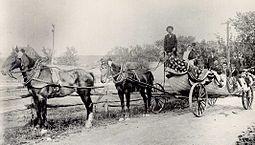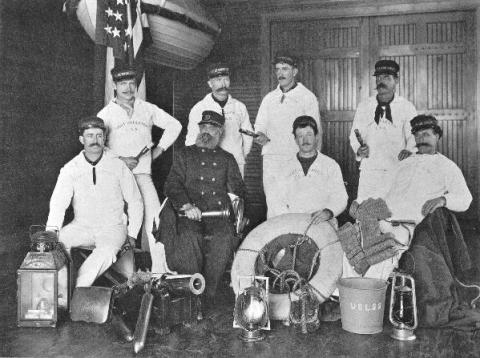
U.S. LIFE-SAVING SERVICE
The United States Life-Saving Service was a Federal Government agency formed in 1848 that grew out of private and local humanitarian efforts to save the lives of shipwrecked mariners and passengers. The organization ultimately merged with the Revenue Cutter Service to form the U.S. Coast Guard in 1915. Joshua “Captain James” James is perhaps the best know of its early pioneers.
Joshua James was born on November 22, 1826 in Hull, Massachusetts, the seventh of ten children. His father had emigrated as a young man from the Netherlands after serving in the Dutch Army before becoming a sailor. On April 3, 1837, at the age of 10, Joshua witnessed a pivotal event in his life when he was an eyewitness to the death of his mother and a baby sister in a shipwreck of a schooner that encountered a sudden squall as it neared Hull. The squall threw the schooner on her beam which filled with water and sank before Mrs. James and her baby could be rescued. At an early age, Joshua began to go to sea with his father who at one time owned a fleet of twelve vessels which primarily hauled cobblestones to be used in paving streets in and around Boston.
Joshua’s lifesaving activities began on December 17, 1841, when he was only 15-years old. He leaped aboard a surfboat manned by volunteers from the Massachusetts Humane Society and assisted in saving sailors aboard a ship being “hammered shapeless” which had grounded near Hull. This began his six decades membership in the Massachusetts Humane Society which later became the U.S. Life-Saving Service. Joshua was not just a man of the sea; he was also a man of the surf. In the 1800s, it was not uncommon to live a lifetime in one place and not uncommon to be born into a large family like Joshua’s of twelve children. As a youngster Joshua gravitated to the sea learning every trade a waterman could do to earn a living. The nearby Port of Boston became the busiest port in the nation and Hull frequently saw 100 ships pass daily on their way to or from Boston Harbor. Stormy Northeast weather resulted in greater numbers of shipwrecks with numerous vessels going ashore and hundreds of victims needing help. Joshua had to earn a living while serving as a volunteer lifesaver and thus worked at the usual watermen’s jobs, such as fishing, salvaging ships, lightering cargoes from ship to shore, and transporting heavy paving stones from Hull to Boston. As a young man, Joshua became captain on one of his father’s vessels and forever after was regularly known as “Captain James”.
At the age of 24, Joshua was recognized for his bravery and skill by the Massachusetts Humane Society by the award of the MHS Bronze Star, his first such award. At the age of 50, he became an MHS station keeper and in 1884 received the MHS Silver Medal for more than 40-years of brave and faithful service. The highlight of his lifesaving career likely took place in the late 1880 when he led his MHS crew in rescuing 29-men from six different shipwrecks. It was an unprecedented feat of skill, leadership, and sheer physical strength for a man of his age. In 1890, after nearly fifty years of dedicated service he became the Keeper of the new Life-Saving Station at Point Allerton where he and his surfmen became renowned for their amazing prowess as lifesavers.
On March 17, 1902, tragedy struck the nearby Life-Saving Station at Monomoy Island. Nearly all of the station’s surfmen were accidentally drowned by the panicking victims they had tried to save. Joshua learned of the tragedy two days later and felt the loss deeply. The incident convinced Joshua of the need for even more rigid training of his own crew. Thus, at seven o’clock the morning of March 19, with a northeast gale blowing, he called his crew for a drill and to test a new self-bailing, self-righting surfboat. For more than an hour the 75-year-old man maneuvered the boat through the boisterous sea. He was pleased with the performance of the boat and crew. Upon grounding the boat, Joshua stepped onto the wet sand, glanced at the sea, and stated, “The tide is ebbing.” These were reportedly his last words as he then fell dead on the beach from a heart attack. Joshua was buried with a lifeboat for a coffin at Hull Village Cemetery in Hull, Massachusetts, where his tombstone bears the Massachusetts Humane Society seal and the Biblical inscription, “Greater love hath no man than this -- that a man lay down his life for his friends.” The superintendent of the U.S. Life-Saving Service paid him tribune saying, “Here and there may be found men in all walks of life who neither wonder or care how much or how little the world thinks of them. They pursue life's pathway, doing their appointed tasks without ostentation, loving their work for the work's sake, content to live and do in the present rather than look for the uncertain rewards of the future. To them notoriety, distinction, or even fame, acts neither as a spur nor a check to endeavor, yet they are really among the foremost of those who do the world's work. Joshua James was one of these.”
Historical records reveal Joshua is recorded to have participated in the rescue of survivors from over fifty shipwrecks and undoubtedly participated in numerous others. The number of lives he saved is uncertain, but records estimate the number as anywhere between 600 and at least 1,000. During the thirteen years he was keeper of the Point Allerton station he and his crew saved a reported 540 lives and $1,203,435 worth of estimated value of ships and cargo. In his memory the Coast Guard Cutter USCGC Joshua James (WMSL-754) was commissioned in 2015. In his honor, the Coast Guard presents the prestigious Joshua James Ancient Keeper Award in recognition of longevity and outstanding operational performance at Coast Guard boat force units.
POINT ALLERTON, MA - CAPTAIN JAMES IN BLACK UNIFORM

FUNERAL PROCESSION
Submitted by CDR Roy A. Mosteller, USNR (Ret)

